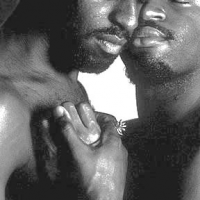 by Matt Zofchak, Research Assistant at the National Minority AIDS Council
by Matt Zofchak, Research Assistant at the National Minority AIDS Council
The numbers are not new. Black gay and bisexual men still bear the heaviest burden of the HIV epidemic, with particularly alarming increases in the rate of incidence among young Black MSM. In the spirit of renewing focusing and engagement around the needs of Black gay and bisexual men, NMAC has taken the last three years to review the literature regarding the contextual and structural factors that impact the ways in which Black gay and bisexual men manage their health. Highlighting three key sociocontextual factors – social determinants, the criminal justice system and access to care – NMAC has issued a series of strong and comprehensive recommendations to more adequately address the health needs of these men in order to continue driving the epidemic down to zero.
In honor of National Men’s Health Week, NMAC would like to expand our recent efforts by stepping back for a moment to look at the broader health care needs of this community. HIV and AIDS is not the only health issue affecting this community, or gay and bisexual men writ large. In addition to HIV/AIDS, there exists a host of comorbidities that affect gay and bisexual men, especially Black MSM. For instance, one study shows that Black gay and bisexual men are more likely to face depression (30%) and anxiety (33%) than the general population (9.3-21%, 11-29% respectively). Furthermore, Black gay and bisexual men face increased risk for primary and secondary syphilis infection, with rates among Black MSM being 1.3-8.6 times the rate of White MSM, and with Black MSM holding the highest rates of infection among any population between 2005 – 2008. Among young Black MSM, the burden is even greater, with 15 – 19 year olds marking the greatest absolute increase in rates of primary and secondary syphilis infection among Hispanic or White MSM of any age group. These trends are unacceptable and must be reversed in our collective struggle towards healthier, more empowered communities.
Moreover, Black gay and bisexual men have been shown to have particular high prevalence rates of eating disorders, including subclinical bulimia, compared to other racial/ethnic GLBT groups. Issues with body image are of particular concern for GLBT communities of color which already face a nexus of compounding stigma factors that collectively hinder their ability to manage their health. NMAC is determined to foster and strengthen awareness and engagement efforts to ensure these individuals have all the necessary resources at their disposal to lead the healthiest lives possible.
For Black men regardless of sexual orientation or gender identity, incidence rates for both colorectal and prostate cancer are well above the national average. For instance, the CDC reports that the incidence rate of colorectal cancer for Black men is 62/100,000, while the national average at 52.7/100,000 and with additional racial/ethnic populations resting at significantly lower numbers. With regard to prostate cancer, the incidence rate for Black men (215.5/100,000) is nearly double the rate for White Men (125.5/100,000), and well above the national average (137.7/100,000). These numbers are staggering and reveal the ways in which Black men are disproportionately impacted not just by HIV and AIDS, but other serious health issues as well.
As is mentioned in our report RISE Proud: Combatting HIV Among Black Gay and Bisexual Men, attention needs to be refocused towards the structural and contextual factors that contribute to the longstanding and continuing health disparities among GLBT communities of color, particularly Black gay and bisexual men. Social determinants such as access to stable housing, access to care, food security, educational attainment, vocational opportunities, and systemic prejudice and discrimination within the criminal justice system need to be deconstructed and assessed in order to have the most accurate and comprehensive information possible to best combat these health disparities. Health care inequities across the board must be remedied through inclusive policy measures that can lead us to the future we envision for our communities and which we all deserve.
As Black gay and bisexual men across the country have made evident time and again, they often are left feeling “as though they are devalued within institutions of supposed care and protection… [which leads to] a sense that there is no recourse, since the social safety net itself is a source of discrimination”. As an organization dedicated to empowering individuals and communities to live healthier lives in the face of adversity, NMAC is steadfast in its promise to remain on the frontlines of our collective struggle. NMAC is dedicated to making a positive impact on the lives of GLBT communities of color in order to ensure that recourse is indeed available, to ensure that the health care system itself does not continue to be a source of stigmatization and to enhance community capacities to fully and adequately combat the health disparities they have been fighting for all too long. Highlighting the needs and concerns of Black gay and bisexual men who remain at the heart of this struggle, NMAC continues to make great strides forward to not only address the impact of HIV and AIDS on this community, but to also shed light on the host of other health concerns and comorbidities which additionally impact HIV transmission rates and hinder these individuals’ efforts to lead happy, long and healthy lives.